Italian Cooking Made Simple: Tips and Tricks
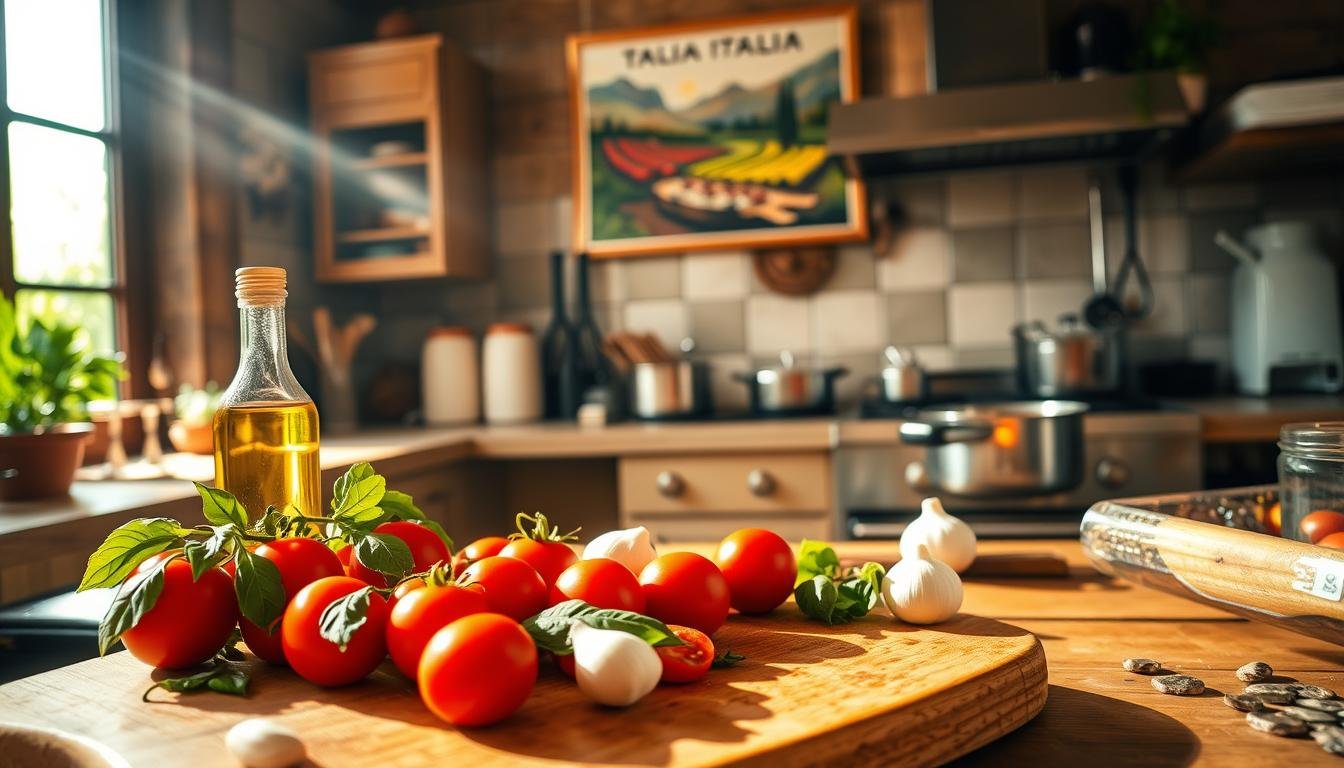
Italian cooking brings magic into the kitchen. Stepping in with fresh ingredients, I’m transported to Rome. The air smells like bread and tomato sauce. It feels like being in a cozy Italian spot, right at home.
Italian cuisine is simple and real. It’s like speaking a delicious language with ingredients. Use fresh tomatoes, creamy mozzarella, and basil. You’re not just cooking; you’re making art.
Starting with easy Italian cooking? No worries. With a little guidance and love, anyone can do it. You don’t need to be a pro. Let’s make some unforgettable meals together with simple ingredients.
Key Takeaways
- Italian cooking emphasizes quality, fresh ingredients for authentic flavors.
- Simplicity in techniques makes Italian cuisine accessible to all levels of home cooks.
- Understanding basic staples like fresh tomatoes, mozzarella, and herbs is essential.
- With the right guidance, anyone can master Italian meal preparation.
- Cooking Italian dishes connects you to a rich cultural tradition and heritage.
- Enjoyment and passion are key ingredients in easy Italian cooking.
Introduction to Italian Cooking
Dive into the amazing world of Italian cooking with us! We are here to ensure you have fun learning. From Italian Cooking Basics to Authentic Italian recipes, we cover it all! Let’s kick off with key tips to get you started correctly.
The Importance of Fresh Ingredients
Fresh ingredients matter a lot in Traditional Italian cuisine, more than you might think. Imagine eating bruschetta with fresh, tasty tomatoes or pasta with real basil and pure olive oil! High-quality, fresh ingredients truly elevate a dish. Let’s talk about why they are so important.
- Authentic Flavor: Fresh ingredients bring out the real taste of Authentic Italian recipes. Picture ripe tomatoes, *fresh herbs*, and fine olive oil.
- Nutritional Value: Fresh produce is richer in nutrients compared to processed food.
- Texture and Color: They also enhance the look and feel of your dishes, making them as beautiful as they are delicious.
The Role of Herbs and Spices
In Italian cooking, the magic is in the seasoning. Herbs and spices are key. They turn simple meals into amazing ones. Let’s check out some must-haves.
- Basil: Essential for classic dishes like pesto and caprese salad.
- Oregano: Perfect in tomato sauces and pizza.
- Rosemary: Gives a wonderful aroma and taste, great for meats and potatoes.
- Garlic: Vital for that true Italian flavor in pasta and stews.
Ready to start this tasty journey? Knowing these Italian Cooking Basics and how to use herbs and spices, you’ll be making Authentic Italian recipes like a chef soon!
Essential Italian Cooking Techniques
Learning Italian cooking has changed how I cook! Knowing how to make pasta and sauté takes your food up a notch. We’ll explore these key skills that make Italian food great.
Mastering the Art of Pasta Making
Creating pasta at home might seem hard, but it’s worth it! Making spaghetti or ravioli well is key. Here are important tips:

- Use Semolina Flour: This gives pasta the right feel.
- Rest the Dough: Let it sit for 30 mins to get gluten right.
- Roll Thin: Thin sheets mean evenly cooked pasta.
- Cook Al Dente: It should be tender but firm.
Sautéing and Its Variations
Sautéing is the first step in many Italian dishes. It’s a must for tasty pasta and more. Here’s how to sauté like a pro:
- Use High Heat: A hot pan sears food fast.
- Choose the Right Oil: Olive oil brings the right flavor.
- Work in Batches: Too much in the pan and things steam, not sauté.
- Season Well: Add salt and pepper for taste.
Mastering Italian cooking techniques turns simple things into amazing meals! So, put on your apron and start making Italian pasta and sauté like a chef!
Key Ingredients to Stock in Your Pantry
For those eager to try Italian cooking, getting the right pantry items is key. You’ll be ready for traditional recipes or quick meals. Having the right ingredients makes everything better.
Common Pasta Varieties
Pasta is essential in Italian meals. There are lots of types, like spaghetti, fettuccine, penne, and farfalle. Each type works well with different sauces. This lets you cook many authentic dishes.
Italian Cheeses You Should Know
Cheese is very important in Italy. Parmigiano-Reggiano, or parmesan, is hard and great on pasta. Mozzarella melts well in pizza and lasagna. 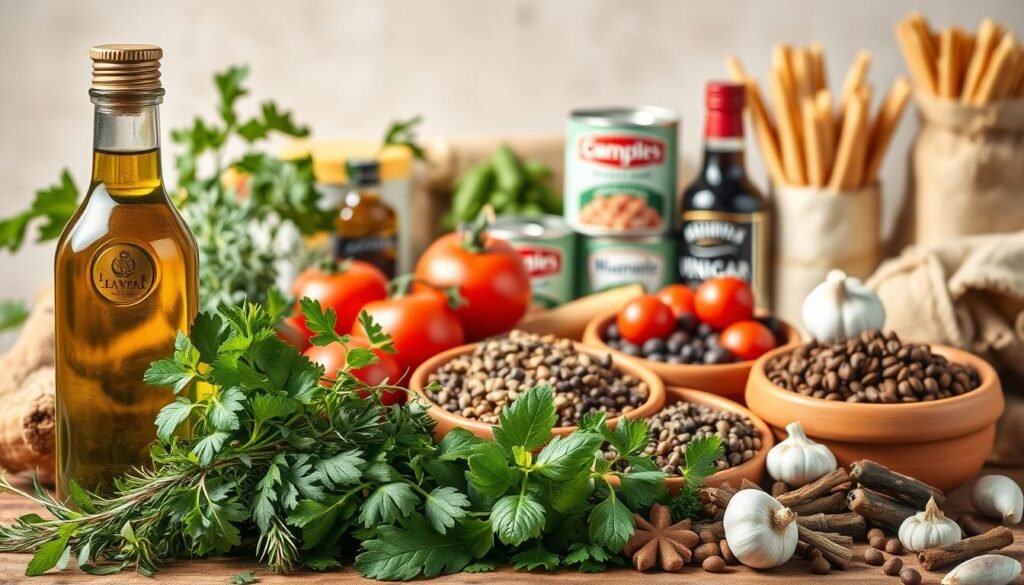
Essential Oils and Vinegars
Good oils and vinegars are must-haves. Use extra virgin olive oil for salads, cooking, and bread dipping. Balsamic vinegar elevates salads, marinades, and more. They add real Italian taste to your food.
With these essentials, you’re ready to cook Italian meals at home! Buon appetito!
Classic Italian Dishes You Can Make at Home
Making *Homemade Italian meals* in your kitchen is very satisfying. Let’s explore some *popular Italian dishes* you can easily make. Enjoy these dishes with loved ones! Ready to try some delicious *Italian Food Recipes*? Let’s start!
Margherita Pizza
Making a classic Margherita Pizza is wonderful. It was named for Queen Margherita of Italy. You only need dough, fresh mozzarella, tomatoes, basil, and olive oil. The simple ingredients make the flavors stand out. Try this *Homemade Italian meal* to taste real Italian flavors at home.
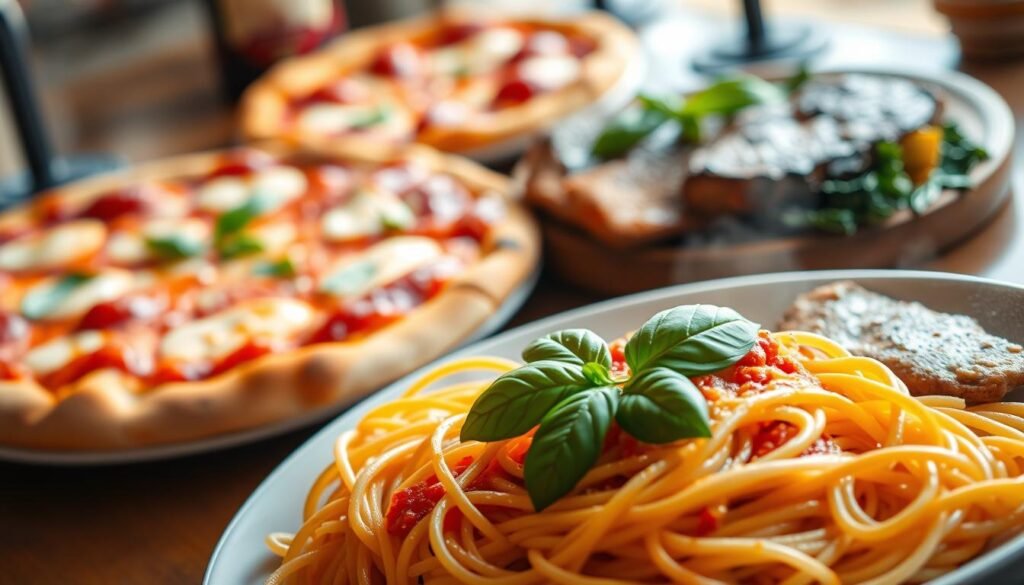
Risotto alla Milanese
Risotto alla Milanese is a great dish to try. Saffron makes it colorful and aromatic. It’s creamy, with chicken broth and Parmesan cheese. Making this dish takes focus, but it’s worth it. Your guests will love this elegant *Homemade Italian meal*.
Tiramisu: A Timeless Dessert
An Italian meal isn’t complete without Tiramisu. It’s a creamy dessert with coffee-flavored ladyfingers and mascarpone cream. Topped with cocoa powder, it’s a classic. It’s simple to make and very tasty. This dessert is one of the most *popular Italian dishes* for home cooks.
So, get ready to cook up some classic *Italian Food Recipes*. Buon Appetito!
Exploring Regional Italian Cuisines
Discovering regional Italian cuisines is like finding a chest full of treasures. Each area has its own special flavors and traditions. From the creamy dishes in the North to the spicy ones in the South, learning about these foods can make your meals amazing.
Northern Italian Specialties
In Northern Italy, the cold weather makes the food rich and warm. Picture eating a creamy risotto that melts in your mouth. There, they love dishes with butter and cheese, like velvety veal Milanese or juicy osso buco. You’ll also find lots of creamy sauces and tasty cheeses.
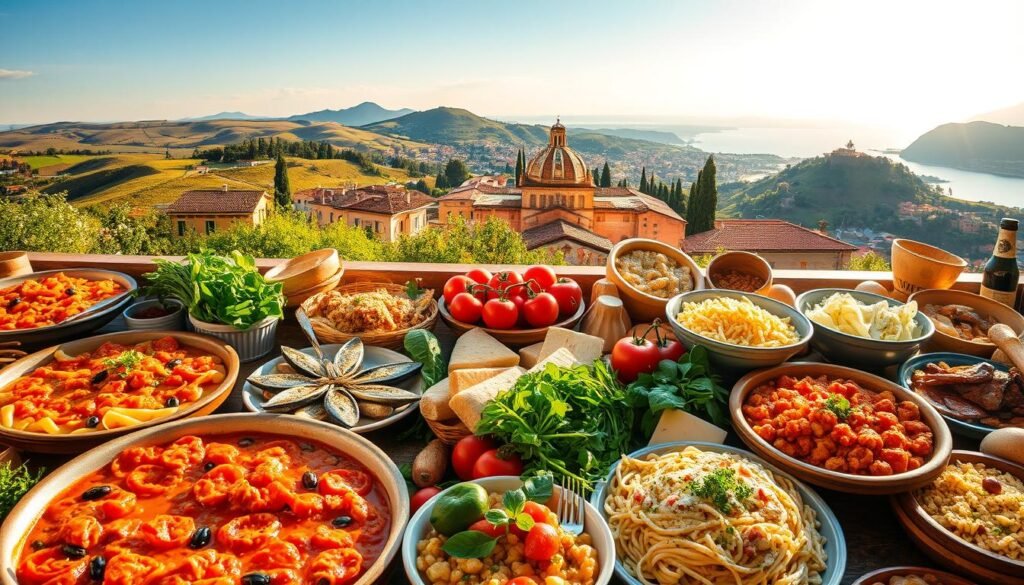
Southern Italy’s Rich Flavors
The South is all about sunny Mediterranean vibes! Imagine juicy tomatoes, sweet basil, and fresh seafood. Southern dishes are simple but strong in flavor. They love using olive oil, making their food zesty but light. Try spaghetti alla puttanesca or eggplant parmigiana to feel the sun in every bite.
| Element | Northern Italian Specials | Southern Italian Flavors |
|---|---|---|
| Main Ingredients | Butter, Cheese, Meats | Olive Oil, Tomatoes, Fish |
| Climate Influence | Colder climate for hearty dishes | Warmer climate for fresh produce |
| Signature Dishes | Risotto, Veal Milanese, Osso Buco | Spaghetti alla Puttanesca, Eggplant Parmigiana |
| Flavor Profile | Rich, Creamy, Buttery | Bold, Spicy, Fresh |
Cooking Equipment for Italian Cuisine
Mastering Italian cuisine means having the right tools. With the best Italian cooking equipment, you can make your family mealtimes special. Everyone will love the authentic flavors!
Must-Have Kitchen Tools
Essential tools can change your cooking game. Make sure you have the following in your kitchen:
- Pasta Maker: Fresh, homemade pasta is a game-changer.
- Cheese Grater: For perfectly grated Parmesan or Pecorino Romano.
- Mortar and Pestle: Ideal for grinding fresh herbs and spices.
- Wooden Spoons: Gentle on your pots and great for stirring sauces.
- Quality Knives: A good set of knives ensures precision in your chopping and dicing.
The Importance of Quality Cookware
Quality cookware is key in Italian cooking. Good pans and pots improve your cooking and the taste of your dishes. Here are some must-haves:
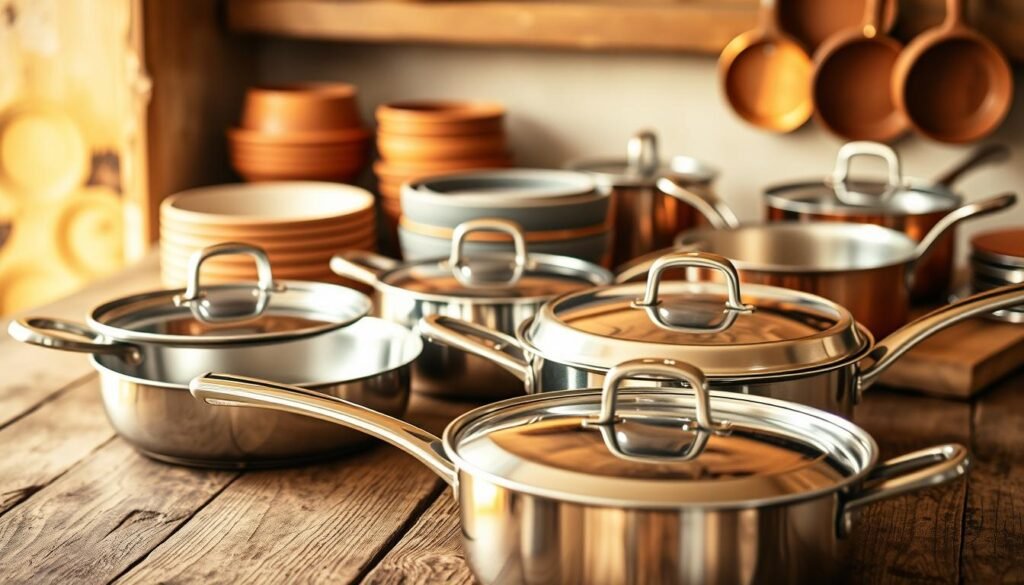
| Cookware Type | Best Use | Top Brands |
|---|---|---|
| Cast Iron Skillet | Searing meats and making frittatas | Le Creuset, Lodge |
| Non-Stick Sauté Pan | Sautéing vegetables, making risottos | All-Clad, Calphalon |
| Stockpot | Cooking pasta and large batches of soup | Cuisinart, Tramontina |
Using the right tools makes Italian cooking at home even better. They help you achieve greatness, from grinding herbs to searing meat. You’ll feel like a pro.
Pairing Italian Food with Wine
Italy gives us delicious food and amazing wines. Wondering how to match your wine with Italian dishes? Here are easy tips for perfect pairings of pasta, pizza, and more with wine.

Tips for Choosing the Right Wine
Matching Italian food and wine is fun. Start by pairing the wine’s body with the food’s richness. Try matching the dish’s regional origin with a wine from the same place. Consider the main ingredient and how the dish is cooked.
Light seafood goes well with white wines like Pinot Grigio. For a rich Bolognese, choose a strong red like Sangiovese.
Think about the acid level too. Dishes with tomatoes pair well with acidic wines such as Chianti. For mushroom dishes, try earthy wines. They highlight the flavors of both the food and wine.
Classic Pairings for Popular Dishes
Here are classic Italian pairings to wow your guests. Check out this table for some ideas:
| Dish | Recommended Wine |
|---|---|
| Margherita Pizza | Chianti |
| Risotto alla Milanese | Pinot Grigio |
| Lasagna | Barbera |
| Osso Buco | Valpolicella |
| Tiramisu | Moscato d’Asti |
The key is to boost the flavors of both the food and wine. The right wine makes any Italian meal even better. So enjoy your next Italian dish with a great wine. Cheers and buon appetito!
Tips for a Successful Italian Dinner Party
Planning an Italian dinner party? It’s all about great food and a cozy vibe. Looking for tips to throw the best one? Let’s dive into what makes a dinner truly memorable and genuine for your guests!
Menu Planning and Theme Ideas
Italian meal planning should be simple and real. Begin with favorite starters like bruschetta and caprese salad. Choose pasta like spaghetti carbonara or a tasty lasagna for the main dish. Include a rich entrée such as chicken piccata or osso buco. End with a sweet tiramisu or panna cotta. Keep it all Italian for a perfect food journey.

Make a menu with different tastes and feels. Add light salads and antipasti, rich pasta, and a filling protein. This lets your guests taste all parts of Italian food!
How to Create an Inviting Atmosphere
To make your dinner feel Italian, focus on the table. Choose rustic cloths, fine plates, and lots of candles for warmth. Add flowers or small herbs as natural decor. Soft, warm lighting makes the mood right. Fairy lights bring an outdoor Italian feel inside.
Music helps set the mood, so play Italian classics. Choose songs by Andrea Bocelli or Eros Ramazzotti for real Italian flair. Serve food family-style for a shared, fun meal.
Success lies in the little things that make guests feel welcome. From smart menu choices to the right atmosphere, your dinner will radiate Italian warmth.
Conclusion and Final Thoughts
We’ve learned a lot! From mastering pasta to wine pairings, our Italian cooking journey was joyful. Even if you’re starting out or already love cooking, the key is to enjoy the process. Italian food is about experimenting and making the dish your own. Don’t worry about mistakes—practice makes perfect and is fun too!
Encouragement to Experiment and Enjoy Cooking
Using Italian herbs and spices can turn simple meals into amazing ones. So, feel free to add extra basil or rosemary. As you get better at Italian cooking, mix tradition with your own style. Trying new things is what makes cooking fun. Your special touch might become a family treasure!
Now, jump into your kitchen and try these tips. Have friends over for dinner or spend a night making perfect risotto. Cooking is about sharing love and culture. So create, taste, and cherish every moment of your cooking journey. Happy cooking!